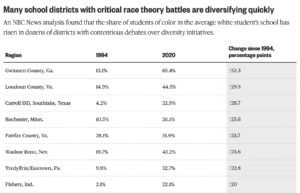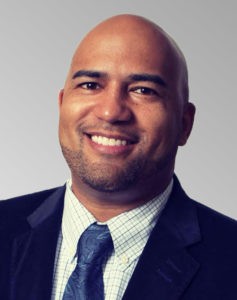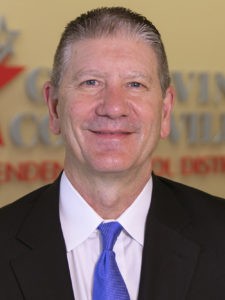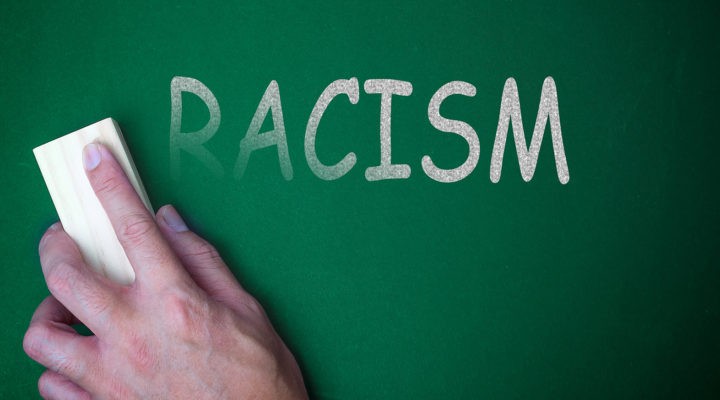Colleyville, Texas, is consistently ranked as one of the “safest cities” in Texas — that is, unless you are the first Black principal of the predominantly white suburban Fort Worth high school.
Colleyville Heritage High School Principal James Whitfield is on his way out the door at the school apparently not for malfeasance or ineptitude but for daring to say a word about systemic racism in America.

James Whitfield with students at a Colleyville Heritage High School pep rally.
He is one of the latest victims of the anti-anti-racism movement in America, which has fixated on the perceived dangers of teaching a law-school derived legal construct known as Critical Race Theory. Across North Texas in recent months, parents have been mobilized to storm school board meetings and demand that Critical Race Theory be expunged from the curriculum — even forbidden to be taught — whether there is any evidence this graduate-level theory has been taught there.
While parents have been similarly rallied to protest Critical Race Theory across the nation, observers believe North Texas has become the epicenter of organized protests that have turned often boring school board meetings into free-for-alls that make the evening news.
There’s a pattern, though
New research by NBC News shows there’s another pattern to these protests — they’re mainly happening in areas that have experienced significant demographic changes that have brought more diversity to those communities and schools.
NBC reported that its analysis of “33 cities and counties where school districts have faced rancor over equity initiatives this year in at least three recent school board meetings finds that each has become less white over the last 25 years, reflecting a national trend.”
Colleyville Heritage High School is one of two high schools within Grapevine-Colleyville Independent School District, which brings together students from two adjoining cities in the maze of northern Tarrant County plus some students from two nearby older suburbs, Hurst and Euless. The attendance boundaries for Colleyville Heritage abut three sides of Dallas-Fort Worth International Airport.
While the city of Colleyville (population 27,000) is more than 90% white, the high school’s minority enrollment is 47%, and 17% of students are economically disadvantaged.
While the city of Colleyville (population 27,000) is more than 90% white, the high school’s minority enrollment is 47%, and 17% of students are economically disadvantaged, according to data compiled by US News and World Report. Among the 53% of students who are not white are the 19% of the student body who are Hispanic, the 16% who are Asian and the 6% who are Black.
Despite the ethnic and economic diversity of the high school, the U.S. Census Bureau reports that within the city of Colleyville, 96% of housing units are owner-occupied and the median value of those homes is $516,000.
Across the district, 53% of students are white, while 6% are Black, 10% Asian, and 25% Hispanic. From the mid-2000s to the mid-2010s, total enrollment in the district declined while the percentage of non-white students doubled.
That fits the pattern of the NBC News analysis of school districts most likely to see white parents using Critical Race Theory as a means to protest the demographic changes going on around them.
Study looked also at ‘exposure’
NBC reported that at least 220 school districts nationwide faced a backlash over diversity and equity initiatives from May through August this year. “And student enrollment data suggests that these conflicts tend to occur in communities that experienced significant demographic shifts in recent decades.”

Source: NBC News
Researchers looked not only at total numbers and percentages of population shift within communities and school districts but also at “exposure,” meaning how likely white students are to have classmates of a different race in their school. Larger districts may effectively segregate students by how attendance zones are drawn, for example.
“The analysis, using federal statistics, found that the exposure of white students to students of color increased by 11 percentage points across the United States from 1994 to 2020. And in 22 of the 33 districts facing recent battles over diversity initiatives, the exposure of white students to students of color increased more than that national average,” NBC said.
While Grapevine-Colleyville didn’t make NBC’s list of the school districts facing the most dramatic demographic shifts, it’s adjacent neighbor — located in an even more affluent suburban community — of Carroll Independent School District in Southlake, Texas, clocked in at No. 3. Other top hot spots around the country include Gwinnett County, Ga.; Loudoun County, Va.; Rochester, Minn.; and Fairfax, Va.
A defeated school board member lashes out
What happened at Colleyville Heritage High School is that a defeated school board candidate, Stetson Clark, on July 26 publicly accused Whitfield, the Black principal, of supporting Critical Race Theory and “the conspiracy theory of systemic racism.”
A defeated school board candidate, Stetson Clark, on July 26 publicly accused Whitfield, the Black principal, of supporting Critical Race Theory and “the conspiracy theory of systemic racism.”
Soon after, the school board placed Whitfield on leave, despite howls of protests from students and parents at the high school, where he is beloved. Since then, despite national publicity, the board has not backed down but has continued its process to terminate Whitfield’s employment, later adding a list of 34 items it says are actionable causes for termination.
The principal denies having done anything wrong. He sees himself as a victim of the anti-Critical Race Theory moment sweeping the country, fueled mainly by politicians and preachers associated with former President Donald Trump. Colleyville is an overwhelmingly Republican district that went strongly for Trump in the 2020 election.

James Whitfield
“There’s been a very calculated attack for a long time now on public education,” Whitfield told the Washington Post. “I think it’s much larger than just me — I’m just the one who is caught in this particular scenario. The attack is against anything that promotes an inclusive and welcoming environment where everybody is celebrated and everybody gets an equitable education and is treated fairly.”
In early June 2020, with wave after wave of protest sweeping the nation about racial injustice highlighted by the police murder of George Floyd and others, Whitfield wrote a letter to the school community denouncing discrimination amid historic racial justice protests tied to the Black Lives Matter movement.
“Education is the key to stomping out ignorance, hate, and systemic racism,” Whitfield wrote. “It’s a necessary conduit to get ‘liberty and justice for all.’”
All the feedback he heard from the letter was positive, Whitfield told the Texas Tribune. He didn’t hear a single negative comment.
That is, until a year later when the defeated school board candidate called him out by name at a school board meeting and the elected school board members did not defend their principal but instead put him on leave.
Pastors form a protest group
Out of this community melee, a group of local pastors has emerged to challenge the school board and the parents who say they are concerned about Critical Race Theory.
The group, known as the Fort Worth Circle of Clergy, on Sept. 20 expressed support for Whitfield and traced the sequence of events that led to the principal’s removal, just weeks after his contract had been renewed by the school district.
What happened about the same time, the clergy note, is that the Texas Legislature passed a highly controversial bill backed only by Republicans mandating that any teacher engaging in discussion of any “current event or widely debated and currently controversial issue of public policy or social affairs” must do so from “diverse and contending perspectives without giving deference to any one perspective.”
Then the defeated school board candidate showed up at a meeting to criticize the words the high school principal had written a full year before.
“Dr. Whitfield has told the truth in his public statements over this past year, and he should not be maligned or fired for it.”
“As clergy, we are deeply troubled about both the ethics and legality of what is taking place in the Grapevine-Colleyville ISD. No public information exists to suggest Dr. Whitfield’s employment status was or could have been in jeopardy prior to the actions of Mr. Clark at the July 26 school board meeting,” the group wrote. “The board’s failure to prohibit Mr. Clark from publicly maligning Dr. Whitfield resulted in Dr. Whitfield’s understandable public response. This is his First Amendment right, and the district should in no way, whether in its words or actions, send the signal that it was inappropriate for Dr. Whitfield to have addressed the accusations made against him in public forum.”
Further, the clergy chided the school board for not backing their own employee, especially a Black employee speaking about racial discrimination while working in a community with few Black residents.
“Dr. Whitfield has told the truth in his public statements over this past year, and he should not be maligned or fired for it,” the clergy declared. “For as the Bible says, we shall know the truth and truth shall set us free; so the truth tellers ought to be free also.”
Among the 50 area clergy signing the letter were 17 Baptists, including Ryon Price, pastor of Broadway Baptist Church in Fort Worth, and Dwight McKissic, pastor of Cornerstone Missionary Baptist Church in Arlington. Price is a leader within the Cooperative Baptist Fellowship, and McKissic is a leader within the Southern Baptist Convention.
“What is taking place in Colleyville at this time is, I think, a symptom of a much deeper problem,” Price told the Fort Worth Star-Telegram. “Dr. Whitfield has been caught up in much deeper currents that are at work in our state and in our nation.”

Robin Ryan
School district Superintendent Robin Ryan defended the board’s action, telling the Star-Telegram: “The district has attempted to resolve this issue with Dr. Whitfield and his (legal) representation both informally and formally with no avail. This has played out in this community as a racial issue, and many people are hurt and confused. It’s not about Dr. Whitfield’s race. It’s not about pictures. It’s not about certain individuals in this community calling for his resignation.”
Instead, he said, Whitfield’s removal has to do with “email communications with a party from outside of the school district and accusations of hiding public records from discovery by deleting them from sent items and trash folders.”
Related articles:
White hysteria, Critical Race Theory, and eyes that dare not see | Opinion by David Gushee
It’s not just the SBC banning Critical Race Theory; now state legislatures are joining the fight
Could you win a quiz show by defining ‘Critical Race Theory’? | Analysis by Mark Wingfield


